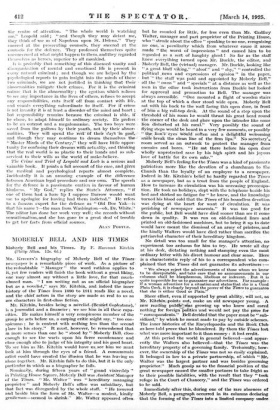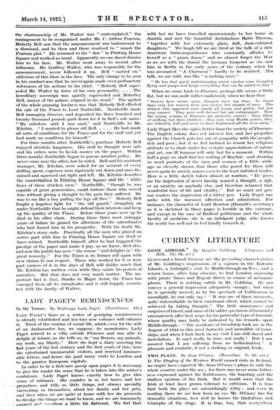310BERLY BELL AND HIS TIMES
Moberly Bell . and his Times. By F. Harcourt Hitchin (Philip Allan. 12s. 6d.) MR. Krivoi-ars biography of Moberly Bell of the Times newspaper is a remarkable piece of work. As a picture of the redoubtable " Manager " the word ruthless applies to . it, yet few readers will finish the book without a great liking, one 'may almost say without a little love, for that much- abused man. " I am writing not as an' official biographer but as a novelist," says Mr. Kitchin, and . indeed the inner history of the Times from 1890 to 1911 reads like a novel, and the chief actors in the story are made as real to us as are characters in first-class fiction.
Mr. Iiitchin,' besides being a nhvelist-(Benfiet.Coplestone), is a journalist and a financier ; we see him in all theSe capa- cities. He makes himself a very conspicuous member of the group he sets before us, a carping critic might say, " too con- spicuous ; he is content with nothing less than the second lace in his story." It must, however, be remembered that in more senses than one he " stood by."-Moberly Bell, else- enough to see the warts upon his fierce countenance and close enough also to judge of his integrity and his good heart. To see him as Mr. Kitchin would have us, see him we must look at him through the eyes of a friend. A consummate artist-could-have created the illusion that he was leaving us alone together. Mr. Kitchin fails to do this, but it is the only- particular in which as a biographer he fails.
Nominally, during fifteen years of " grand viziership " in Printing House Square, Moberly Bell was Assistant Manager of the Times. " Mr. Walter " was " hereditary managing proprietor " and Moberly Bell's office was subsidiary, but that fact was disregarded by the whole staff. " He towered and beside him the form of Mi. Walter—a modest, kindly gentleman—seemed to shrink." Mr. Walter appeared often but he counted for little, for less even than Mr. -Godfrey Walter,. manager and part proprietor of the Printing House,
who " strode about the office " speaking to no one, recognizing no one,:. a : peculiarity which from whatever cause it arose made. " the worst of impressions " and caused him to be regarded as a sort of haughty ghost ! So far as the staff knew everything turned upon Mr. Buckle, the editor, and Moberly Bell, the {virtual) manager. Mr. Buckle, looking like
" a great bluff viking," " aloof" and " shy," " controlled the political .iews and expressions of opinion " in the paper, but -" the staff was paid and appointed by Moberly Bell," all the " Owns " and " specials " at a distance as well as the
men in the office took instructions from Buckle but looked for approval and promotion to Bell. The manager was always accessible: "One mounted a flight of wooden stairs at the top of which a door stood wide open. Moberly Bell sat with his back to the wall facing this open door, in front of him a big roll-top desk. At the sound of a step upon the threshold of his room be would thrust his great head round the corner of the desk and glare upon the intruder like some lion disturbed at his meal." Very possibly the sound of flying steps would be heard in a very few moments, or possibly
" t4e.: lion'S" eyes would- SOften and a delightful Welcoming smile break the clean line of the firm lips." NO secretary's
room served as an outwork to protect the manager from enemies and bores. "He sat there before his open door
wholly unprotected save by his high spirit and his joyous love of battle. for its own sake."
Moberly Bell's feeling forthe Times was a kind of passionate patriotism more like the devotion of a churchman to the Church than the loyalty of an employee to a newspaper. Indeed in Mr. Kitchin's belief he hardly regarded the Tina's as a newspaper, but as a trust from the people of England. How to increase its circulation was his unceasing preocciipa- tion. He took no holidays, slept with the telephone beside his bed and shirked no fatigue for " he knew, and the knowledge turned his blood cold that the Times of his boundless devotion was dying at the heart for want of circulation. It-was perishing of . newspaper anaemia." It was too good, for the public, but Bell would have died sooner than see it--come down in quality. It was run on old-fashioned lines - and printed on old-fashioned machines, but to bring it up. to date would have meant the dismissal of an army of printers,-and
the kindly Walters would have died rather than sacrifice the patriarchal character of their hereditary kingdom.
No detail was too small for the manager's atteation, no experiment too arduous for him to try. He wrote all day at his desk, dictating nothing and stamping even the most
ordinary letter with his direct humour and clear sense. .1-fere is a characteristic reply- of his to a correspondent who com- plained that the Times did not guarantee its advertisers :- " We always reject the advertisements of those whom we know to be disreputable, and take care that no announcements. in our columns shall be blasphemous, libellous or indecent. But it is quite impossible for us to guarantee our advertisers. For exam_ple : if a woman advertises for a situation and states that she is a Good Plain Cook, it is clearly beyond the power of the Times to gum-Mike that she is either Good or Plain.'
Sheer effort, even if supported by great ability,- will not, as Mr. Kitchin:points out, make an old newspaper young. - A
new reading pubffe4:;,istas growing up who knew and cared nothing for foreignilailitics and would not pay the price for " correspondents." Bell decided that the paper must be " sub- sidized," by which he meant made to pay by outside schemes. The inner histories of the Encyclopaedia and the IloOk_Club as here told prove that he blundered. By them the Times lost what was more important to it than money : it lost credit.
At this period the world in general believed—and appar-
ently the Walters also believed—that the Times was- the hereditary property of a governing family. Technically; how- ever, the ownership of the Times was not so easily explained. It belonged in law to a private partnership, of- which "Mr. Walter was the largest partner and was besides governing proprietor." Much gossip as to-the financial position of the great newspaper caused the smaller partners to take fright as to their possible liabilities, with the result that they " took refuge in the Court of Chancery," and the Times was ordered
to be sold.
Immediately after this, during one of the rare absences of
Moberly Bell, a paragraph occurred in its columns declaring that the forming of the Times into a limited company under
the chairmanship of Mr. Walter was " contemplated," the management to be reorganized under Mr. C. Arthur Pearson. Moberly Bell saw that the announcement was tantamount to a dismissal, and he then and there resolved to " smash the Pearson plot." He returned to his " den " in Printing House Square and worked as usual. Apparently no one dared dismiss him to his face. Mr. Walter went away to recruit after influenza. Mr. Godfrey Walter, who was responsible for the announcement, never followed it up. Bell " carried on " oblivious of this blow in the face. The only change to be seen in his conduct was that he never again made even perfunctory references of his actions to his chief. " Moberly Bell super- seded Mr. Walter by force of his own personality. . . . The hereditary sovereign was quietly superseded and Moberley Bell, mayor of the palace, reigned in his stead." The upshot of the whole amazing business was that Moberly Bell effected the sale of the Times to Lord Northcliffe. Northcliffe made Bell managing director, and deposited the three hundred and twenty thousand pounds paid down for it in Bell's sole name. " My solicitors said I was mad," said Northcliffe to Mr.
Kitchin. " I wanted to please old Bell He had made all sorts of conditions for the Times and for the staff and yet had made no condition for himself."
For three months after Northcliffe's purchase Moberly Bell enjoyed absolute happiness. His staff he thought were safe and his orders were to lavish money on the paper. Within three months Northcliffe began to pursue another policy. He never came near the office, but he ruled. Bell and his assistant manager, Mr. Kitchin, were asked for an account of every shilling spent, expenses were rigorously cut down and men dis- missed and squeezed out right and left. Mr. Kitchin describes the consternation in Printing House Square and the " white faces of these stricken men." Northcliffe, " though he was capable of great generosities, could torture those who served him without giving a thought to the pain they suffered. He was to me like a boy pulling the legs off flies." Moberly Bell fought a hopeless fight for " the old guard," struggling on under Northcliffe that he might defend their interests and keep up the quality of the Times. Before three years were up he died in his office chair. During those three most unhappy years of failure he gained the affections of the subordinates who had feared him in his prosperity. With his death Mr. Kitchin's story ends. Practically all the men who played an active part with him in Printing House Square are dead or have retired. Northcliffe himself, after he had beggared the prestige of the paper and made it pay, as we know, died also, and now the public has seen " the rescue " and delights in the great recovery." For the Times is its former self again with new claims to our respect. Those who worked for it or were part owners of it in the days of Bell will dislike much that ,Mr. Kitchin has written even while they salute his powers of narrative. But that does- not very much matter. The im- portant fact is that, thanks to Major Astor, the Times has emerged from all its vicissitudes and is still happily associa- ted with the family of Walter.















































 Previous page
Previous page